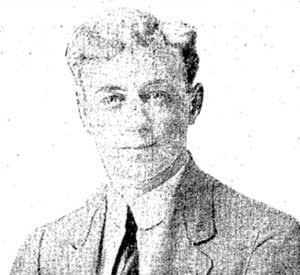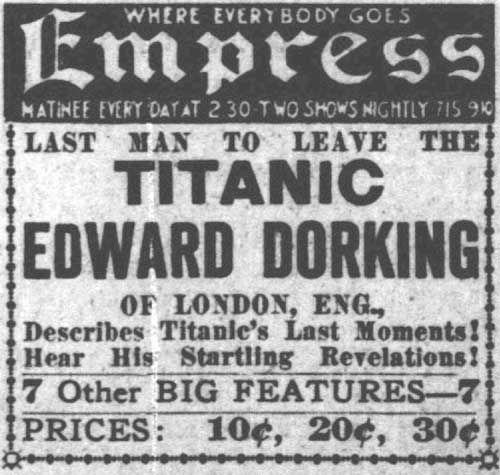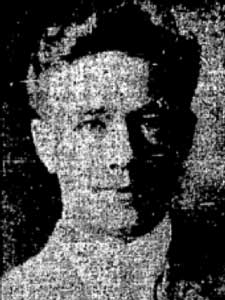Mr Edward Arthur Dorkings1 was born in Stamford Hill, Middlesex, England on 18 June 1893 and was later baptised on 26 July 1894 in St Ann's Church, his address at the time being listed as 231 St Ann's Road.
He was the son of Edward Arthur Dorkings (b. 1867), a policeman, and Florence Derby (b. 1876), both natives of Cambridgeshire who had married in Lambeth, London just over a year before his birth on 25 February 1892. He had two sisters, Edith May (b. 1892) and Dorothy "Dolly" (1894-1989, later Mrs Alfred A. Rawlinson).
Edward first appears on the 1901 census living with his mother and siblings at 13 Staffordshire Gardens, Cambridge; his father was listed elsewhere as a boarder at 3 Savile Place in Dewsbury, Yorkshire and by then working in advertising.
Edward's father died in Worcestershire in 1904 and his mother was remarried just over three years later in late 1907 to Johnnie Charles Baker (b. 1880), an officer's mess waiter originally from Diss, Cambridgeshire. They had no children together and were shown on the 1911 census as residents of Western Road in Liss, Hampshire; Edward was listed at an address in Finchley, Middlesex where he was a servant to a circus and theatrical proprietor.
Dorkings boarded Titanic at Southampton on 10 April 1912 as a third-class passenger (ticket number 10482 which cost £8, 1s) but was almost turned away due to bloodshot eyes which he attributed to travelling all night to reach the terminal. He was travelling to his uncle and aunt Fred and Violet Cook in Oglesby, Illinois.
He survived the sinking, possibly on collapsible B. Arriving in New York aboard Carpathia he was described as a 19-year-old unmarried labourer, stating his next of kin as his stepfather in Liss.

Dorkings was booked to appear at the Princeton Theatre before he even reached Illinois and was the recipient of further offers to keep him busy for some time. He gave the following account in the Bureau County Republican (2 May 1912):
"It was at ten minutes to midnight on the 14th that we struck the iceberg. I was in the music room playing cards with several companions. When the boat collided with the berg, we were thrown from the bench on which we were sitting. The shock was accompanied by a grinding noise, which we took to be the result of an accident to the machinery that suddenly halted the ship. "I went on deck to see what had happened and saw several persons running to the forward part of the ship. I followed and found that the port side was strewn with particles of ice. Someone said we had struck an iceberg and that a huge hole had been torn in the port side below the waterline. "I obtained a good glimpse of the iceberg as it floated by. It was off some distance then, but in the clear night, I could see it rising out of the water like a great white spectre, towering above the funnels of the ship. To me it seemed that the iceberg was at least four or five times as large as the Titanic.
... At that time there was no sign of panic. The passengers and crew seemed to feel assured that the collision was not serious and that there was no grave danger to the ship. I returned to the music room and resumed our card game. After a while some of the foreigners in the steerage became excited and the women began to weep and before long there was a stream of them pouring out of the steerage dragging their luggage with them. They were driven out by the water which was rushing into the hold in a huge stream, in spite of the pumps which were working furiously. In a little while longer, the nose of the boat began to dip forward. As the ship began to list the excitement of the lower decks increased and there was a scramble for the life boats. Men and women, stricken with fright, huddled around the crew, shouting and crying and sending up prayers to heaven for aid. I was on deck when the first boat was lowered away. It contained but fifteen or sixteen persons. The next boat had thirty or forty and the rest were loaded to their full capacity, which is fifty-five or sixty. The women and children were taken off first. An officer stood beside the life-boats as they were being manned and with a pistol in hand, threatened to kill the first man who got into a boat without orders.
"The rule of 'women first' was rigidly enforced. Two stewards hustled into a lifeboat that was being launched. They were commanded to get out by the officers and on refusing to obey the command, were shot down and thrown into the sea. A Chinaman was also shot for the same cause. Afterwards, aboard the Carpathia, I saw six Chinamen who had escaped in the life-boats, disguised as women. "There were about sixteen life-boats lowered away, that being all that were on board the Titanic. As the last boat had departed I turned to go below to get my life-belt, which was under my bunk. As I passed the engine room, I saw Captain Smith, standing in the doorway, giving orders to the crew. The perspiration was pouring down his face in streams, but he was calm and collected, and as I recollect him now, he appeared like a marble statue after a rain. "I never reached the life-preserver. The water by that time was above my bunk and I had to retreat on deck. All the time the forward part of the boat, where the side had been jammed by the iceberg, was dropping lower and lower into the water, until it became necessary for those remaining on board to grasp something stationary to keep erect.
"How long it was after the last boat left the ship until the Titanic went down, I have no distinct recollection. It seemed like an age to me. As I clung to the ship rail, turning the situation over in my mind, I finally concluded that I would take a chance of jumping into the water and risk being picked up by some of the boats. It seemed certain doom to remain. I sat down on the deck and removing my shoes and outer garments, I plunged over the rail and shot into the water forty feet below. "As I struck the chilly water, I received a shock that took my breath away, but as soon as I rose to the surface, I struck out from the ship, with no idea in mind except to get beyond the suction line when the Titanic should go down. I was perhaps twenty yards off when the grand big liner, suddenly tipped up on its nose, the rear end lifted out of the water exposing the propeller blades, and slid gently forward to its watery grave. The sinking of the ship caused scarcely a ripple on the ocean's surface.
"It seemed to me that a half hour elapsed from the time I left the ship until an upturned life-boat with about thirty men and one woman on it, passed the spot where I was swimming. There were many others in the same predicament as myself and it was a constant fight to prevent those whose strength was almost spent from grasping me about the neck or by the limbs in a desperate effort to keep from drowning. "I was fortunate enough to grasp the side of the upturned life-boat as it floated past me. I clung on with both hands, at the same time warding off two men who had given up their hold on the life-boat and had grasped me by the legs. When my strength was about giving out, the men on the raft gave me assistance and dragged me over the side to a place of safety. "We drifted about during the remainder of the night, suffering intensely from cold and exposure. Three of our number died and were thrown overboard and two others slipped off and failed to get back again.
"It was just about daybreak that our sinking spirits were cheered by the sight of a rocket, which announced that succour was near. An hour later, as the morning light was dawning, we were picked up by a rescue-boat. I guess I must have become unconscious then, for when I woke up, my companions were feebly cheering at sight of the Carpathia, standing off about a mile distant.
"One of my companions at the hospital was a lookout, who had been saved from the Titanic. He told me that before the ship struck the iceberg, he had been warning three times of the impending danger. The first time, he said, no attention was paid to the warning, the second time, the result was the same, and the third warning came too late." Mr. Dorking was discharged from the hospital last Wednesday and came direct to LaSalle by way of Chicago, arriving at the home of his uncle on Saturday. He was given a complete outfit of clothing and twenty-five dollars to pay his transportation to LaSalle. Mr. Dorking says that when he went to purchase his ticket in New York, he discovered that twenty dollars of the money had been stolen from him. Through the generosity of New Yorkers, he was enabled to reach his destination..." - Salt Lake Tribune, 20 November 1912
Dorkings appears to have spent at least seven months travelling and telling his story; by 29 September 1912 he was leaving Vancouver and travelling back into the USA, describing his profession as "Vaudeville" and his method of arrival in the US as aboard Carpathia; he was intending then to settle in Seattle but was known to have still been giving lectures elsewhere by late November. He was described as standing at 5' 6" and he had brown hair, a fair complexion and blue eyes.

One of many ads for Dorkings' lectures
His vaudeville career now exhausted, Dorkings was enlisted into the US Army in May 1917 but it is not clear if he saw any active service and he was demobilised on 25 January 1919. By that time he was living in Los Angeles, having departed Illinois on account of run-ins with the police. Whilst the nature of his offences is not known Edward was, according to family, openly gay at a time when this was frowned upon in society and illegal in most jurisdictions. He is also believed to have become a heavy drinker years after the sinking.
Dorkings commenced a career at sea although this period of his life remains largely unknown; however, he was shown on immigration records entering Honolulu, Hawaii in May 1927 from Shanghai, China, still described as a British citizen. He made a return trip to Britain aboard the Ormonde in September that same year and was described as a seaman and headed to 26 Belgrave Road, Cambridge, the home of his mother.

He applied for US citizenship in November 1928 whilst a resident of Houston, Texas. Described as a seaman standing at 5' 7" and with blonde hair, blue eyes and a ruddy complexion, his address was stated as the Terminal Hotel in Houston. The following year he was recorded as a crewmember aboard Franklin, then docked in Port Arthur, Texas.

Edward's signature at the time of his declaration of intent for US citizenship, 1928
By 1933, at the time of his military pension record, Edward was back living in Los Angeles and entered a soldier's home in Sawtellen that city, again describing his profession as that of a seaman and his nearest living relative as his mother who was still living in Cambridge. By that stage of his life, aged just 40, he was suffering from a range of ailments which included arthritis and toothlessness.
At the time of his military draft in 1942 he was retired and still living at the soldier's home; the year previous he became a US citizen and specified his address as 3401½ East 7th Street, Los Angeles and by that time was sporting a tattoo on his right shoulder.
Dorkings became estranged from his family and spent his final days in incarceration on Terminal Island in San Pedro, California although the nature of his crime is not known. In poor health for the remainder of his life, Edward Arthur Dorkings died on 12 April 1954 aged 60.
Edward was cremated at the Los Angeles county crematory, he was buried in an unmarked grave because no relative picked up the urn with his ashes it was buried in a common grave, the exact location in the section is not known.
His last surviving sibling was his youngest sister Dorothy; she married in 1916 to Alfred A. Rawlinson, a train driver with whom she raised a family. She lived for many years in Cambridge but passed away in Wilmslow, Cheshire on 23 April 1989.


Comment and discuss
Open Thread Leave a Reply Watch Thread Search other threads